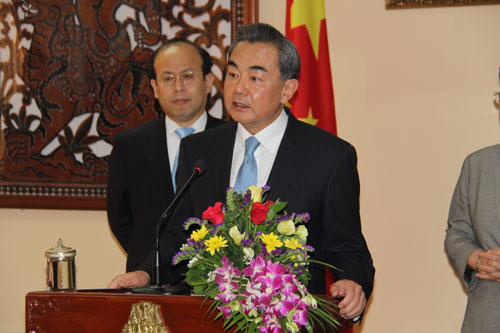
On April 22, 2016, when meeting the press jointly with Minister of Foreign Affairs and International Cooperation Prak Sokhon of Cambodia, Foreign Minister Wang Yi said that the claim that initiating arbitration conforms to the international law while rejecting arbitration violates the international law is definitely untenable in international practice. Persistently exerting pressure on China in this regard is either political arrogance or legal prejudice.
Wang Yi pointed out that there is sufficient legal basis for China not to participate in or accept the South China Sea arbitration initiated unilaterally by the Philippines.
First, the UN Charter and international law advocate each country to settle disputes peacefully through dialogues and negotiations. The United Nations Convention on the Law of the Sea (UNCLOS) respects the dispute settlement independently chosen by each country. China insists that disputes shall be settled through dialogues and negotiations by parties directly concerned. China is exercising its legitimate right to reject a compulsory arbitration.
Second, as early as ten years ago, China has issued a government statement to exclude a compulsory jurisdiction in accordance with the rights entitled by the Article 298 of the UNCLOS. Although the Philippines’ resort to arbitration has obviously been wrapped with all kinds of packages, people with the slightest legal knowledge will be aware that such resort would inevitably involve and affect China’s territorial sovereignty and rightful maritime rights and interests, which is clearly within the excluded jurisdiction.
Third, Article 4 of the Declaration on the Conduct of Parties in the South China Sea (DOC), jointly signed by China and 10 member states of the Association of Southeast Asian Nations (ASEAN), explicitly clarifies that specific disputes shall be settled through dialogues and negotiations by parties directly concerned. China’s nonparticipation and rejection of the arbitration is actually a fulfillment of its responsibilities as well as obligations, and an effort to maintain the effectiveness and seriousness of the DOC.
From this point of view, China’s stance on the arbitration conforms to requirements of international rule of law, and regulations and norms in the international law of the sea. China’s conducts are fully in accordance with the law.
Wang Yi pointed out that in contrast, the Philippines unilaterally initiated the arbitration. This behavior has violated the common international practice that arbitration shall be agreed by parties concerned, and the Philippines’ commitment made in bilateral documents it signed with China on settling disputes through dialogues. It has also breached Article 4 of the DOC signed by the Philippines, which stipulates that territorial and jurisdictional disputes should be resolved through friendly consultations and negotiations by parties directly concerned. The Philippines’ behaviors are no other than a distortion and abuse of the international arbitration mechanism.
